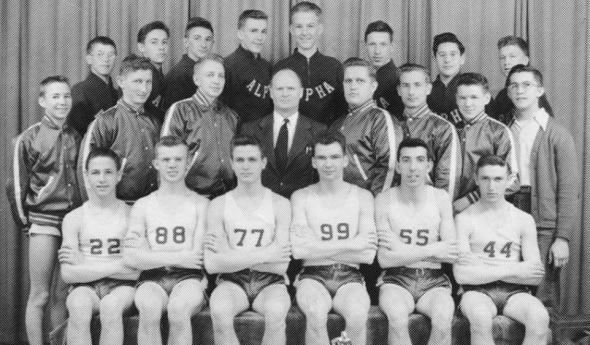
Before the Bridge: Class E & the UP
July 31, 2017
By Ron Pesch
MHSAA historian
This is the final part in a series on MHSAA tournament classification, past and present, that has been published over the last two weeks and originally ran in this spring's edition of MHSAA benchmarks.
The stories are worthy of the silver screen.
Long lost legends of lore, forgotten by most in the Lower Peninsula of the state of Michigan.
Absurd anecdotes of basketball played behind glass, and out-of-bounds lines painted on walls.
Tales of overlooked places like Trenary and Champion and Doelle and Watersmeet.
This is the story of MHSAA Class E basketball.
From 1932 to 1947, Michigan's Upper Peninsula did not compete in the state-sponsored basketball tournament. Instead, the U.P. held a separate basketball tournament, crowning champions in Classes B, C and D. In 1941, the state added a fifth classification – Class E, comprised of schools with a student body numbering 75 or fewer. A fourth bracket was added to the U.P. tourney.
Following the 1948 season, the Upper Peninsula returned to the state tournament. Winners of the traditional U.P. tourney were pronounced regional champions, and advanced to the state quarterfinals in Classes B, C and D. However, since there were no Class E schools with basketball teams in the Lower Peninsula, the winner of the U.P. tournament crown was proclaimed Class E state champion. This arrangement continued through the spring of the 1960 season.
Since they were the state's smallest high schools, the gymnasiums came in all shapes and sizes. Some sported a center circle that intersected with the top of the key. Basketball courts that doubled as a stage required netting to keep the kids and the ball on the court and away from the audience seated below.
Fred Boddy, a former coach at Champion, recalled his first visit to Doelle. Located in copper country near Houghton, the hosts were the proud owners of “the smallest” gym in U.P.
“I couldn't believe my eyes. ... Here on the second floor were windows and bleachers all around filled with fans. The gym, of course, was located on the first floor, but to get into the gym one had to go around to the back of the school to enter through the boiler room to the locker rooms, which opened onto the gym floor much like a dugout on a baseball field. The players sat on a bench under the wall and could look out and see the game in this manner. The free throw lines intersected and there were no out of bounds lines... the wall itself was ‘out of bounds.’ On the floor during the game were 10 players and two referees. There were no sounds as all the fans were up on the second floor, glassed in.
The cheerleaders tried valiantly to fire up the fans up on the second floor, but the teams couldn't hear in the quiet below. The score clock and statistician personnel were placed in a corner box high over the floor in one corner of the gym. They attained this lofty perch by a ladder that was removed from the trap door after all three were in position and the game could thus commence. The timer then tied a rope around his ankle. To send a sub into the game the coach would send the player along the wall heading for this rope. He would pull the rope causing the timer to look down through the trap door and at next opportunity would ring the buzzer and admit this substitute”
Regardless of the challenges presented by these cracker-box gyms, the fans loved their basketball. “The enthusiasm was just the same, if not bigger, than schools twice and 10 times their size,” noted longtime U.P. historian, Jay Soderberg.
Coach Joseph Miheve's 1941 Palmer squad captured the state's first Class E title with a 39-28 win over Hulbert at Ironwood. A graduate of Wakefield High School, Miheve had never played high school basketball, serving as the team's manager.
The 1942 tournament, scheduled for March 19-21, was postponed one week because the city of Marquette was more or less taken over “by nearly 1,000 selective service registrants from every county in the Upper Peninsula” who had another and more serious battle in mind – World War II.
Palmer, this time coached by Elvin Niemi, repeated in Class E with a 37-31 victory over Bergland. It was Palmer's 32nd consecutive victory.
No tournament was held in 1943 due to the involvement of the United States in the war. In the 1944 championship game, Cedarville jumped out to a 19-14 first quarter lead but was held to 24 points in the remaining periods and fell to Amasa, 51-43 at Ishpeming.
Trenary made its lone Class E finals appearance in 1945, losing to Bergland 49-39 at Ishpeming, while the Alpha Mastodons won their first U.P. title since 1934 with a 48-28 win over Champion in 1946. It was the second of five Class E titles for Alpha coach Gerhardt “Gary” Gollakner, one of the finest coaches to come out of the U.P. Gollakner had coached at Amasa two years earlier, and his Mastodons would earn three additional titles during the 19-year run of the Class E championships.
Bergland became the tourney's second two-time winner in 1947, with a 40-37 win over the Perkins Yellowjackets. Perkins made four trips to the Class E finals over the years, including an appearance in the final year of the tournament, but came away empty-handed each time.
The Nahma Arrows made their first appearance in the championship in 1951, losing to Michigamme. Led by coach Harold “Babe” Anderson, a cage star at Northern Michigan College during the early 1940s, the Arrows returned to the finals in 1952. Nahma finished the year with a 21-0 mark and a 64-44 win over Marenisco for the crown.
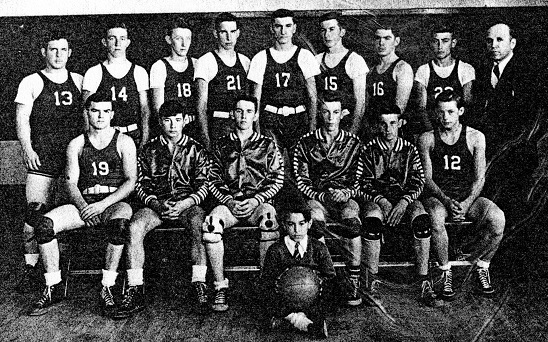 The two teams met again in a finals rematch the following year. The scored was tied six times, while the lead changed hands seven times in this barnburner. With 15 seconds to play, Nahma led 64-60. Marenisco's Robert Prosser hit a jump shot, then teammate Bill Blodgett stole a pass and scored to knot the game at 64. With two seconds remaining, Nahma's Bernard Newhouse was fouled. Newhouse hit the first free throw, but missed on the second. Teammate Wendell Roddy tipped in the rebound, and the Arrows had their second title.
The two teams met again in a finals rematch the following year. The scored was tied six times, while the lead changed hands seven times in this barnburner. With 15 seconds to play, Nahma led 64-60. Marenisco's Robert Prosser hit a jump shot, then teammate Bill Blodgett stole a pass and scored to knot the game at 64. With two seconds remaining, Nahma's Bernard Newhouse was fouled. Newhouse hit the first free throw, but missed on the second. Teammate Wendell Roddy tipped in the rebound, and the Arrows had their second title.
Alpha returned to the championship circle in 1954 with a 52-48 win over Perkins.
The 1955 title game matched a pair of the finest teams in Class E history. Trout Creek, making its first championship appearance, downed Alpha 84-83 in another Class E thriller. Don Mackey led the winners with 39 points. Tony Hoholek paced Alpha with 31, while junior John Kocinski added 21-points for the Mastodons.
Kocinski, a four-year starter at Alpha, scored 1,782 points during his career, then an all-time U.P. record. He once scored 51 points against Amasa, and could have scored more according to teammate Walter “Slip” Ball. “He refused to shoot in the fourth quarter, and passed up one shot after another,” Ball said.
Without question, Trout Creek was one of the powerhouse squads during the final years of the tourney. The Anglers, coached by Bruce “Pinky” Warren, a former captain of Purdue's football team, made four trips to the finals during the last six years of the Class E tourney. The defending champions downed Alpha in the semifinals of the 1956 tournament, then knocked off Hermansville 86-68 in the finals to repeat. It was a year of celebration for fans of U.P. basketball, as four of the state's five champions – Stephenson (B), Crystal Falls (C), Chassell (D) and Trout Creek (E) – came from Michigan's northern peninsula.
Hermansville returned to the finals in the spring of 1957 and earned its second Class E title with a 77-51 win over Michigamme at Escanaba. Trout Creek downed Perkins 61-41 for their third crown in 1958.
The 1959 championship, hosted at Northern Michigan College's fieldhouse, was a showdown of the U.P.’s only undefeated squads, Trout Creek and Nahma. Trout Creek was riding a 24-game winning streak that dated back to the 1958 season. A scoring machine, Warren's Anglers averaged 81.7 points per contest. Nahma, 19-0 on the season, boasted the U.P.'s strongest defense. Still coached by “Babe” Anderson, the Arrows had allowed an average of 38.2 points per game. Led by senior Warren Groleau, Nahma had been last defeated by Trout Creek in the semifinals of the 1958 tourney.
Leading 25-15 at the intermission, Nahma matched Trout Creek point for point in the second half for a 55-45 victory.
Hermansville, behind Richard Polazzo's 29 points and Irwin Scholtz's 27, downed surprise finalist Perkins 72-50 in the 1960 finale, to end this chapter in MHSAA history.
Today, most of the former Class E high schools are long gone. Many have closed their doors and consolidated with other area schools. Amasa and Alpha merged with Crystal Falls to form Forest Park. Palmer is now part of the Negaunee school system. Bergland and Trout Creek joined forces with Class D Ewen to form Ewen-Trout Creek. Hermansville combined with Powers to form North Central, to name but a few. A few remain: Dollar Bay, Marenisco (now Wakefield-Marenisco) and Watersmeet, and their enrollments are much the same as in the glory days of the state's fifth classification.
Author’s note: Special thanks to Jay Soderberg and Roger Finlan, who assisted in gathering statistics and quotes used in this article. Thanks also to Dick Kishpaugh, Bob Whitens, Walter “Slip” Ball, Dennis Grall, Fred Boddy, Bruce Warren, Gene Maki, Harold “Babe” Anderson and the various personnel at U.P. high schools for their contributions to this story.
PHOTOS: (Top) The Alpha boys basketball team won the 1950 Class E title by nearly doubling up Michigamme, 52-28. (Middle) Hermansville claimed the 1948 title with a 58-38 win over Rockland.
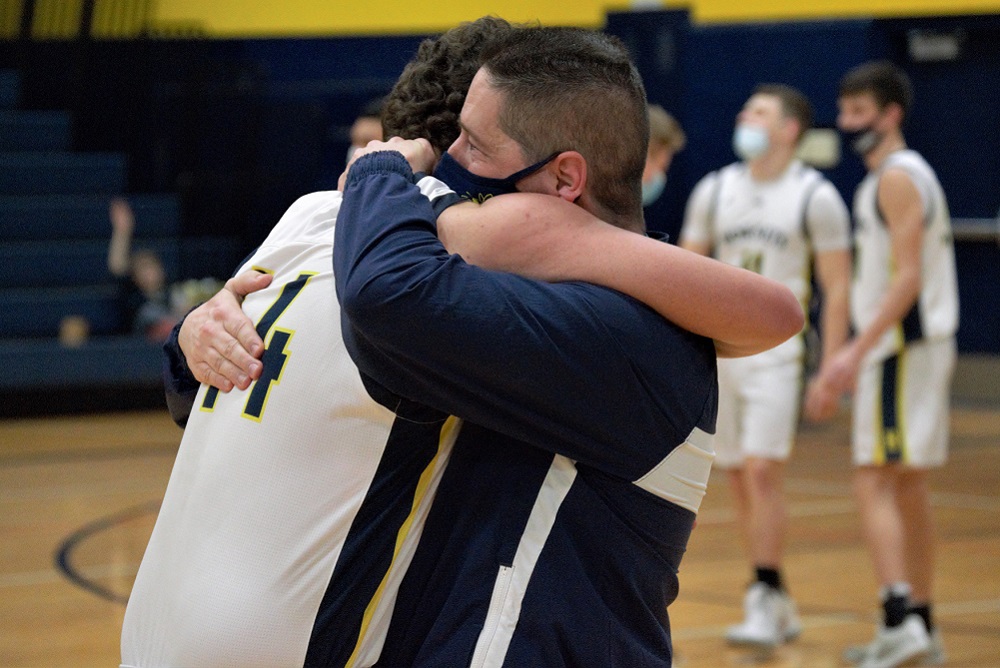
Felix Leaving Hillsdale Having Blazed Path to Statewide Success, Respect
By
Doug Donnelly
Special for MHSAA.com
September 15, 2021
HILLSDALE – Every time Jordan Bollin would prepare his Dundee Vikings boys basketball team to play Hillsdale, he would rename all of his plays. That’s because Brad Felix, the longtime Hillsdale coach, knew them all.
 “He had his teams so prepared,” Bollin said. “We’d call out a play and they would know exactly what we were doing. I had to rename all my plays, then quiz my kids over them before we played them. He’s such a great coach.”
“He had his teams so prepared,” Bollin said. “We’d call out a play and they would know exactly what we were doing. I had to rename all my plays, then quiz my kids over them before we played them. He’s such a great coach.”
Felix stepped down this week as the Hornets’ head coach, ending a coaching career that spans more than 30 years.
“I think he is the best coach I’ve coached against,” Bollin said. “When I got the job at (Temperance) Bedford, the first thing I did was call him up and basically interview for an hour, asking about practice plans and this and that.”
Citing a health issue as one of his reasons for retiring, Felix said it was still a difficult choice to make.
“It is a decision I don’t take lightly,” Felix said. “I feel like there has been a death in my family. The sadness I am feeling is pretty intense.”
Felix didn’t come to Hillsdale from the Upper Peninsula to turn around Hornets boys basketball. But, over the past couple of decades, Felix has helped transform Hillsdale boys hoops into a program known for adding hardware to its trophy case on a regular basis.
The Bessemer native was a four-sport athlete in high school, but that’s where his playing days ended. He graduated from Northern Michigan University in Marquette and landed a job teaching in Hillsdale, at the opposite end of the state, within a few miles of the state line.
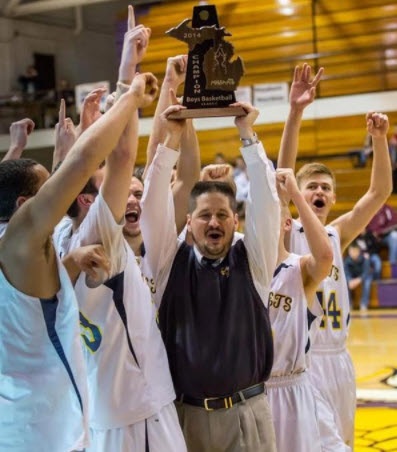 It was the Hillsdale athletic director who approached him about coaching.
It was the Hillsdale athletic director who approached him about coaching.
“He came to me and said, ‘We need a freshmen girls coach and freshmen boys coach; are you interested?’” Felix said. “The rest is history.”
Felix coached both boys and girls at freshmen and junior varsity levels for several years before landing the varsity girls job with the Hornets. He guided that program from 1998 to 2002. His final season with the girls he also became the boys head coach. He’s coached the Hornets boys for the past 19 seasons.
His teams had success early. Capturing the District title in 2005, in his third season, was a first for the school since the mid-1960s.
He said reviving the boys basketball program was the carrot in front of him.
“No one would last this long if he or she was not experiencing some success,” Felix said. “That surely had a great deal to do with me hanging on this long. I was determined to change the mindset and the culture here, so that was a driving force. Our basketball history here was not very glorious, and I thought I could change that path.”
He certainly did that.
During his 19 seasons, Hillsdale won nine league championships, eight District titles and two Regional championships. The Hornets were consistently ranked among The Associated Press top 10 and if they weren’t on top of the league, they were competing for league championships.
His boys teams went 20-0 during the regular season three times and won 20 or more games seven times. In 15 seasons, his teams won at least 14 games. His record as the boys coach was 318-104. Counting his girls varsity tenure as well, he won 369 games. He was a three-time statewide Coach of the Year.
Opposing coaches have long had a ton of respect for Felix and the Hillsdale program.
“His impact on Hillsdale basketball is something many coaches, like me, only could hope for when we are done,” said Onsted boys basketball coach Brad Maska. “The battles we had, Hillsdale vs. Onsted, were some of the best. I will miss that. He made Hillsdale one of the toughest places to go play. He’s a great coach and person.”
Ida boys basketball’s Jared Janssen coached against Hillsdale at least twice every year in the Lenawee County Athletic Association.
“He had an answer for everything you would try to throw at him,” Janssen said. “He is the toughest coach to prepare for.”
Hillsdale had to overcome its share of obstacles. The Hornets played in four conferences during Felix’s tenure, meaning he often had to learn a new set of opponents. With relatively few schools Hillsdale’s size in that area of the state, the Hornets had to go on the road a lot.
“It is not easy to go to Ida on a Tuesday, get home at 11, hit school the next morning, and then go to Dundee on that same Thursday – only to be back in school again Friday morning,” he said. “Those are taxing weeks for sure.”
There were many great memories on the court, such as coaching seven players who scored 1,000 career points, some surprising District wins, buzzer-beaters and epic defensive battles. The 2013-14 team also appeared in a Class C Quarterfinal. His 24-2 Hornets lost to Muskegon Heights, 59-57.
“We played some really good teams to make it there and then fell two points shy in a game where we were huge underdogs,” Felix said.
The 2004-05 team that went 25-1 also played in a Quarterfinal, in Class B. The lone defeat came that night to eventual champion Grand Rapids South Christian.
“Walking on the court at Grand Valley to play that game was a sight I’ll never forget,” he said. “It was just a sea of maize pom-poms with a sea of opposing white ones on the other side. There were 4,000 fans there. That was a just fun.”
Felix said the love of basketball kept him going year after year.
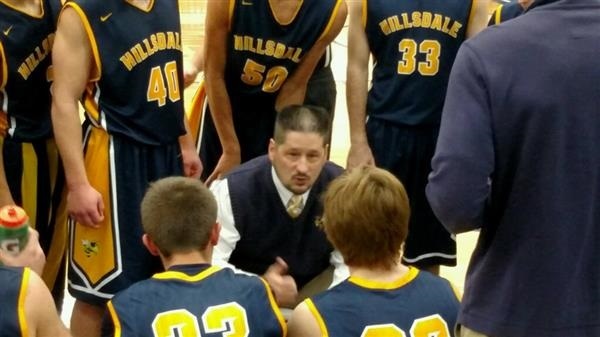 “The strategy and the relationship with the players have kept me in the game,” he said. “The winning helped, but I loved coaching the game and looked forward to each and every season. The most rewarding part of this job has been the relationships I've built with my players that have extended into their adult lives.”
“The strategy and the relationship with the players have kept me in the game,” he said. “The winning helped, but I loved coaching the game and looked forward to each and every season. The most rewarding part of this job has been the relationships I've built with my players that have extended into their adult lives.”
Two of his former players reside in Colorado, where one worked for the Denver Broncos and the other served as an Olympic trainer.
“They flew me out there for a football game and a tour of the Olympic training center,” Felix said. “I was on the field for an NFL game.”
Felix and his wife, Heather, have been married for more than 25 years and have two children, Claire and Adam. He coached Adam. The end of his son’s career was marred by injury, but Brad Felix said having him be a part of the program was a great experience.
“I did get to coach him in at least one season,” Felix said. “His presence on my bench for 12 seasons was so heartwarming for me – he was in the gym and on our bus since he was 5. I swung him through the air on numerous occasions after big wins. He saw a lot.”
It was in June that Felix had a health scare that he says still isn’t over. He said health impacted his decision but wasn’t the ultimatum.
“This will be with me for the rest of my life, unfortunately,” he said. “It weighed into my decision based on all the appointments that I may or may not have in the future, missing practices or games and just the added stress is more than likely not advantageous for me right now.
“I’d be in (coaching) longer if the circumstances had allowed me to.”
 Doug Donnelly has served as a sports and news reporter and city editor over 25 years, writing for the Daily Chief-Union in Upper Sandusky, Ohio from 1992-1995, the Monroe Evening News from 1995-2012 and the Adrian Daily Telegram since 2013. He's also written a book on high school basketball in Monroe County and compiles record books for various schools in southeast Michigan. E-mail him at [email protected] with story ideas for Jackson, Washtenaw, Hillsdale, Lenawee and Monroe counties.
Doug Donnelly has served as a sports and news reporter and city editor over 25 years, writing for the Daily Chief-Union in Upper Sandusky, Ohio from 1992-1995, the Monroe Evening News from 1995-2012 and the Adrian Daily Telegram since 2013. He's also written a book on high school basketball in Monroe County and compiles record books for various schools in southeast Michigan. E-mail him at [email protected] with story ideas for Jackson, Washtenaw, Hillsdale, Lenawee and Monroe counties.
PHOTOS: (Top) Hillsdale boys basketball coach Brad Felix, right, hugs his son Adam after Adam’s final game last season. (Middle) Brad Felix and his 2013-14 team celebrate a big win during their tournament run. (Below) Felix huddles with his players during another game over his 19 seasons guiding the boys basketball program. (Top and middle photos courtesy of the Hillsdale Daily News; bottom photo courtesy of the Hillsdale athletic department.)

